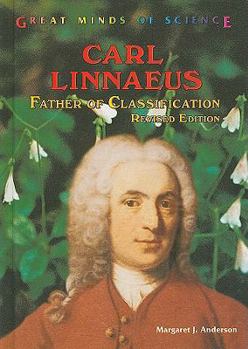Carl Linnaeus: Father of Classification
(Part of the Great Minds of Science Series)
Select Format
Select Condition 
Book Overview
Carl Linnaeus is known as the father of classification. He developed a system for naming living things that helped with the exchange of ideas among scientists. Linnaeus's system, which we still use today, is known as binomial nomenclature. For his innovations in classification, Linnaeus is remembered as one of the great minds of science. Treat readers to a great introduction of Linnaeus' contribution.
Format:Library Binding
Language:English
ISBN:0766030091
ISBN13:9780766030091
Release Date:January 2009
Publisher:Enslow Publishing
Length:128 Pages
Weight:0.90 lbs.
Dimensions:0.6" x 6.5" x 9.3"
Age Range:10 to 17 years
Grade Range:Grades 5 to 12
Customer Reviews
3 ratings
Very Interesting
Published by Thriftbooks.com User , 14 years ago
Carl Linnaeus is a scientific figure rarely taught about in either history or science courses. Known as the "father of classification", Linnaeus reformed the systems used to identify and name plants and animals, replacing them with the binomial (two-word) naming system. Most of us with some degree of biology training are familiar with the "formal" or scientific names for at least a few plants and animals: Canis lupus L. (gray wolf), Felis domesticus (domestic cat), Rhus toxicodendron L. (poison ivy). Despite graduating from high school biology I somehow missed that the L. present after so many scientific names stood for Carl Linnaeus, the man who originally named so many of them. Margaret J. Anderson's accessible biography of Linnaeus, Carl Linnaeus: Father of Classification, presents the Swedish scientist in an engaging and colorful format for middle school readers. Filled with accounts of Linnaeus' childhood, education, travels, writings, career, family, and more, there is plenty of personal detail here to engage the man on the level of human emotions. Anderson also provides insight into his passion for botany, and follows the development and growing acceptance of binomial nomenclature. I greatly enjoyed learning the basic framework of the contributions Linnaeus made to science, his passion for botany, and how the experiences of nature in his childhood served as the driving force for the rest of his life. Concerned parents may wish to note that some brief mentions of evolution are made in reference to Darwin in the chapter "Before and After Linnaeus", but the vast majority of the text does not address the issue of origins at all. The revised 2009 edition from Enslow Publishers' Great Minds of Science series features colorful pages, historical maps, photographs from the places Linnaeus lived and journeyed to, and paintings of the man himself. Activities for young botanists, examples of binomial nomenclature, a timeline, glossary, further resources, and index make this title a treasure worthy of supplementing studies of botany, general biology, or the history of scientific progress with. Ambitious young scientists may be drawn to this title as inspirational reading. Printed with a reinforced, hardcover library binding, this title is designed to serve as a reference volume for years to come.
Great Science Book!
Published by Thriftbooks.com User , 14 years ago
This book doesn't look like it would be interesting, but as the saying goes, you can't judge a book by its cover. This book was really informative and not boring in the least. I would definitely recommend it. Very enjoyable.
Swedish Botantist
Published by Thriftbooks.com User , 24 years ago
I enjoyed reading about this Swedish botantist who worked out a system for classifying plants. I didn't realize that Linnaeus was also the one who came up with cultured pearls after watching pearl fishermen open several thousand mussels to find one pearl.Linnaeus organized huge nature walks on Saturdays with as many as 150 people. He was a very popular lecturer at the university. Those who keep travel journals or nature diaries will find its black coat and white waistcoat, its wrinkled forehead and hooked nose and the effect it gives of wearing spectacles, it looks extremely comical when it walks..."The last chapter provides activities for the budding botantist (no pun intended) like making a flower press and collecting seeds.





